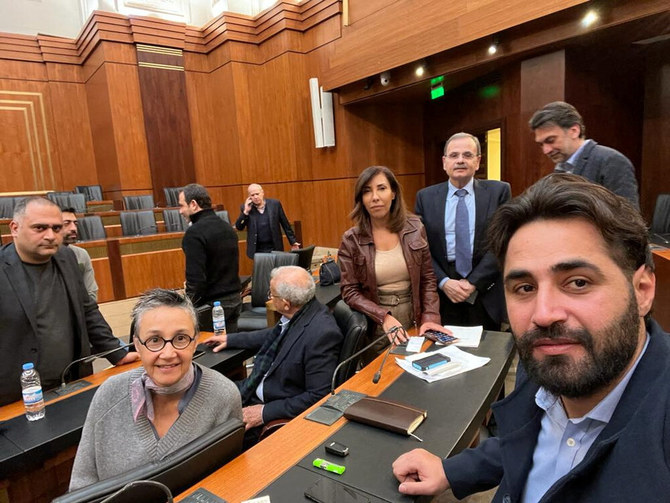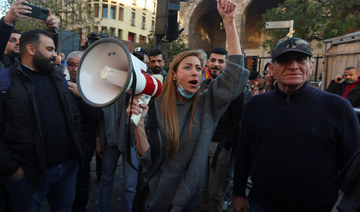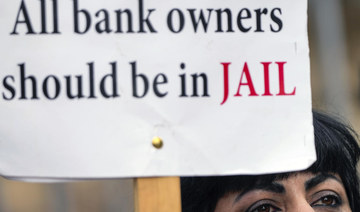BEIRUT: More MPs have joined independent lawmakers staging a sit-in inside Lebanon’s 128-seat parliament to protest at the ongoing vacuum of power.
Protesters held their own sit-in outside parliament in solidarity with MPs angry at the failure to elect a new president.
Reformist MPs Najat Saliba and Melhem Khalaf launched their protest in the plenary hall of parliament last Thursday to put pressure on factions to elect a president, nearly three months on from the post falling vacant.
Reformist MPs Halima Kaakour and Firas Hamdan joined the protesters on Friday night, in addition to George Okais and Razi Al-Hajj from Lebanese Forces.
Khalaf told Arab News: “We are not protesting; we are applying the law.
“We don’t have the right to complain, as the Lebanese people have been living for months without electricity and services.
“Our presence in the plenary hall shows the people that patience results in a functional country.
“We don’t want to convey helplessness to the people.
“Our legal duties compel us, pursuant to article 74 of the constitution, to be present in the parliament without invitation and elect a president without any conditions.”
The MP added that article 75 stipulated that the deputies had turned into an electoral body and “we don’t have the right to perform any other role.”
He added: “Some 26 deputies have arrived in the plenary hall to confirm the eligibility of the step we took.”
Independent deputy Abdel Rahman Al-Bizri said: “There should be a democratic political breakthrough inside parliament. It is the only solution for the crisis.
“The deputies inside the parliament are not staging a protest, but carrying out their duties.
“The parliament has a real chance to carry out its role and elect a president away from any foreign and regional considerations.”
Al-Bizri believes that the action initiated by Khalaf and Saliba may have helped bring matters to a head after 11 failed electoral sessions.
He emphasized that the main purpose of the move was to protect the Lebanese presidential and parliamentary system.
Okais said: “What’s needed is to unify the opposition against Hezbollah and its allies and turn the presidential elections into a purely Lebanese process, if the intentions are good.
“We don’t mind holding a dialogue to discuss a presidential candidate other than Michel Moawad, provided he’s a reformist and sovereign candidate.”
Okais added that he had told the protesting deputies in the hall that what they were doing was “a noble act,” but added he had questioned what was to follow.
He highlighted what he termed a strategic and ideological divergence between the protesting MPs.
He said: “If the opposition does not agree on one name, then the protest will be in vain and similar to climbing up a tree without knowing how to get down.”
Progressive Socialist Party MP Bilal Abdallah said it was necessary to “follow a new dynamic when tackling the presidential election.”
He added: “We don’t boycott nor disrupt the process, but we urge everyone to hold more dialogue that actually generates effective results, rather than futile ones.”
Regarding the results of dialogue between Hezbollah and the Progressive Socialist Party on the presidential elections, Abdallah said: “It revolved around the need to keep elections away from current political alignments and confrontations, and avoid repeating the scenario of the former mandate.
“Dialogue with other political parties continues in order to reach an internal settlement and turn the presidential election into a purely Lebanese process.
“It seems that foreign countries do not care about Lebanon today, and solutions and follow-ups are not their priority. That’s why we took this step and we won’t stop.”
Lebanon has had neither a president nor a fully empowered Cabinet since Michel Aoun’s term ended in October.
More MPs join sit-in inside Lebanon’s parliament amid political crisis
https://arab.news/mnnyy
More MPs join sit-in inside Lebanon’s parliament amid political crisis

- ‘We are not protesting, we are applying the law,’ Reformist MP says
- The MP added that article 75 stipulated that the deputies had turned into an electoral body and “we don’t have the right to perform any other role.”
Syrian first lady Asma Assad has leukemia, presidency says

- Statement stated that Asma would undergo a special treatment protocol that would require her to isolate
DUBAI: Syria’s first lady, Asma Assad, has been diagnosed with leukemia, the Syrian presidency said on Tuesday, almost five years after she announced she had fully recovered from breast cancer.
The statement said Asma, 48, would undergo a special treatment protocol that would require her to isolate, and that she would step away from public engagements as a result.
In August 2019, Asma said she had fully recovered from breast cancer that she said had been discovered early.
Since Syria plunged into war in 2011, the British-born former investment banker has taken on the public role of leading charity efforts and meeting families of killed soldiers, but has also become hated by the opposition.
She runs the Syria Trust for Development, a large NGO that acts as an umbrella organization for many of the aid and development operations in Syria.
Last year, she accompanied her husband, President Bashar Assad ,on a visit to the United Arab Emirates, her first known official trip abroad with him since 2011. She met Sheikha Fatima bint Mubarak, the Emirati president’s mother, during a trip seen as a public signal of her growing role in public affairs.
Yemen’s Houthis say they downed US drone over Al-Bayda province

- The Houthis said last Friday they downed another US MQ9 drone over the southeastern province of Maareb
DUBAI: Yemen’s Houthis downed a US MQ9 drone over Al-Bayda province in southern Yemen, the Iran-aligned group’s military spokesperson said in a televised statement on Tuesday.
Yahya Saree said the drone was targeted with a locally made surface-to-air missile and that videos to support the claim would be released.
The Houthis said last Friday they downed another US MQ9 drone over the southeastern province of Maareb.
The group, which controls Yemen’s capital and most populous areas of the Arabian Peninsula state, has attacked international shipping in the Red Sea since November in solidarity with the Palestinians in the war between Israel and Hamas militants, drawing US and British retaliatory strikes since February.
Iranians pay last respects to President Ebrahim Raisi

- Mourners set off from a central square in the northwestern city of Tabriz
- Supreme leader Ayatollah Ali Khamenei declares five days of national mourning
TEHRAN: Tens of thousands of Iranians gathered Tuesday to mourn president Ebrahim Raisi and seven members of his entourage who were killed in a helicopter crash on a fog-shrouded mountainside in the northwest.
Waving Iranian flags and portraits of the late president, mourners set off from a central square in the northwestern city of Tabriz, where Raisi was headed when his helicopter crashed on Sunday.
They walked behind a lorry carrying the coffins of Raisi and his seven aides.
Their helicopter lost communications while it was on its way back to Tabriz after Raisi attended the inauguration of a joint dam project on the Aras river, which forms part of the border with Azerbaijan, in a ceremony with his counterpart Ilham Aliyev.
A massive search and rescue operation was launched on Sunday when two other helicopters flying alongside Raisi’s lost contact with his aircraft in bad weather.
State television announced his death in a report early on Monday, saying “the servant of the Iranian nation, Ayatollah Ebrahim Raisi, has achieved the highest level of martyrdom,” showing pictures of him as a voice recited the Qur’an.
Killed alongside the Iranian president were Foreign Minister Hossein Amir-Abdollahian, provincial officials and members of his security team.
Iran’s armed forces chief of staff Mohammad Bagheri ordered an investigation into the cause of the crash as Iranians in cities nationwide gathered to mourn Raisi and his entourage.
Tens of thousands gathered in the capital’s Valiasr Square on Monday.
Supreme leader Ayatollah Ali Khamenei, who has ultimate authority in Iran, declared five days of national mourning and assigned vice president Mohammad Mokhber, 68, as caretaker president until a presidential election can be held.
State media later announced that the election would will be held on June 28.
Iran’s top nuclear negotiator Ali Bagheri, who served as deputy to Amir-Abdollahian, was named acting foreign minister.
From Tabriz, Raisi’s body will be flown to the Shiite clerical center of Qom on Tuesday before being moved to Tehran that evening.
Processions will be held in in the capital on Wednesday morning before Khamenei leads prayers at a farewell ceremony.
Raisi’s body will then be flown to his home city of Mashhad, in the northeast, where he will be buried on Thursday evening after funeral rites.
Raisi, 63, had been in office since 2021. The ultra-conservative’s time in office saw mass protests, a deepening economic crisis and unprecedented armed exchanges with arch-enemy Israel.
Raisi succeeded the moderate Hassan Rouhani, at a time when the economy was battered by US sanctions imposed over Iran’s nuclear activities.
Condolence messages flooded in from Iran’s allies around the region, including the Syrian government, Palestinian militant group Hamas and Lebanese militant group Hezbollah.
It was an unprecedented Hamas attack on Israel that sparked the devastating war in Gaza, now in its eighth month, and soaring tensions between Israel and the “resistance axis” led by Iran.
Israel’s killing of seven Revolutionary Guards in a drone strike on the Iranian consulate in Damascus on April 1 triggered Iran’s first ever direct attack on Israel, involving hundreds of missiles and drones.
In a speech hours before his death, Raisi underlined Iran’s support for the Palestinians, a centerpiece of its foreign policy since the 1979 Islamic revolution.
Palestinian flags were raised alongside Iranian flags at ceremonies held for the late president.
Israeli army raids West Bank’s Jenin, Palestinians say seven killed

- Among the Palestinians killed was a surgical doctor, the head of the Jenin Governmental Hospital said
JENIN: Israeli forces raided Jenin in the occupied West Bank on Tuesday in an operation that the Palestinian health ministry said killed seven Palestinians, including a doctor, and left nine others wounded.
The army said it was an operation against militants and that a number of Palestinian gunmen were shot. There was no immediate word of any Israeli casualties.
The health ministry account of the casualties was quoted by the official Palestinian news agency WAFA.
Among the Palestinians killed was a surgical doctor, the head of the Jenin Governmental Hospital said. He was killed in the vicinity of the hospital, the director said.
The West Bank is among territories Israel seized in a 1967 Middle East war. The Palestinians want it to be the core of an independent Palestinian state. US-sponsored talks on a two-state solution to the decades-old conflict broke down in 2014.
Dubai DXB airport sees record 2024 traffic after 8.4% rise in Q1

- Dubai airport welcomed around 23 million passengers in January-March period, operator says
- India, Saudi Arabia and Britain were top three countries by passenger volumes in first quarter
DUBAI: Dubai’s main airport expects to handle a record passenger traffic this year after an 8.4% rise in the first quarter compared with a year earlier, operator Dubai Airports said on Tuesday.
Dubai International Airport (DXB), a major global travel hub, welcomed around 23 million passengers in the January-March period, the operator said in a statement, noting that the uptick was partly driven by increased destination offers by flagship carrier Emirates and its sister low-cost airline Flydubai.
“With a strong start to Q2 and an optimistic outlook for the rest of the year, we have revised our forecast for the year to 91 million guests, surpassing our previous annual traffic record of 89.1 million in 2018,” CEO Paul Griffiths said in the statement.
Dubai is the biggest tourism and trade hub in the Middle East, attracting a record 17.15 million international overnight visitors last year.
Its ruler Sheikh Mohammed bin Rashid Al-Maktoum last month approved a new passenger terminal in Al Maktoum International airport worth 128 billion dirhams ($34.85 billion).
The Al Maktoum International Airport will be the largest in the world with a capacity of up to 260 million passengers, and five times the size of DXB, he said, adding all operations at Dubai airport would be transferred to Al Maktoum in the coming years.
DXB is connected to 256 destinations across 102 countries. In the first quarter, India, Saudi Arabia and Britain were the top three countries by passenger numbers, Dubai Airports added. ($1 = 3.6729 UAE dirham)


















